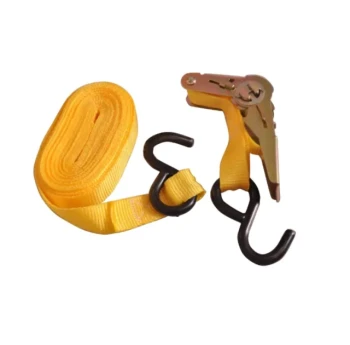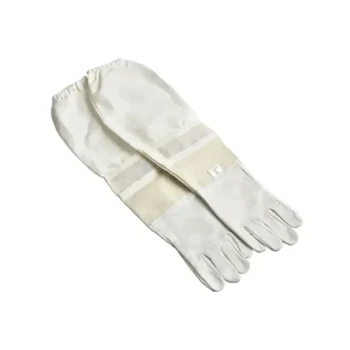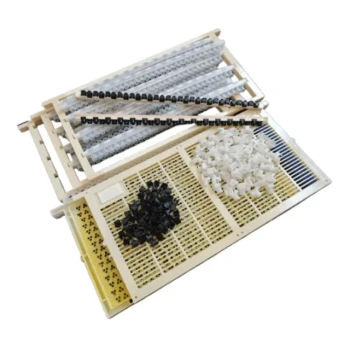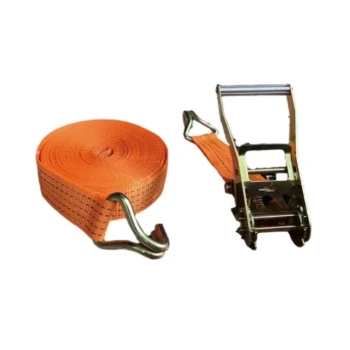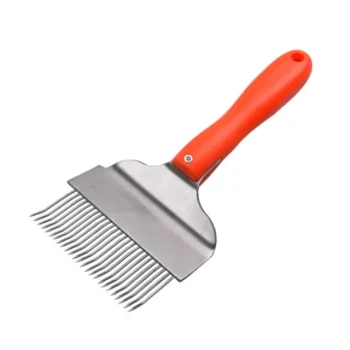For beekeepers evaluating their core equipment, the choice of frame material is a foundational decision that impacts everything from hive health to your personal workflow. Wooden frames are a traditional and popular choice due to their natural composition, versatility in accepting different foundation types, and their alignment with sustainable beekeeping practices. They are easily repaired, can be built from scratch, and are the only viable option for those committed to using pure beeswax foundation.
The decision between wooden and plastic frames is not just about material preference. It's about aligning your equipment with your core beekeeping philosophy, whether you prioritize natural processes, long-term durability, or operational convenience.
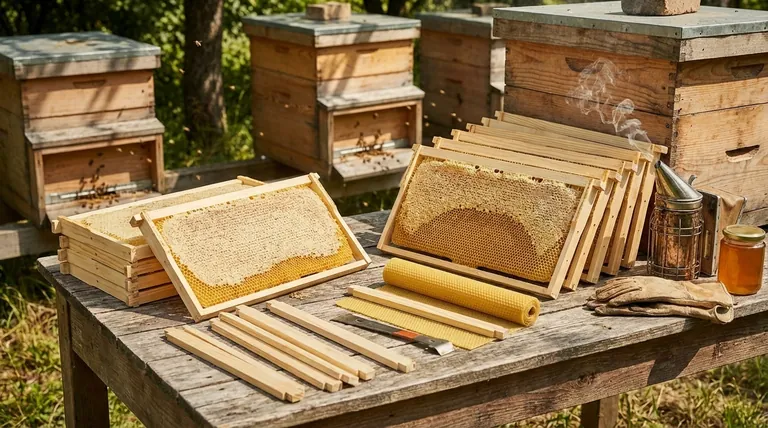
Why Beekeepers Choose Wood: The Core Benefits
The preference for wood is rooted in several practical and philosophical advantages that have stood the test of time.
A Natural and Sustainable Habitat
Wooden frames are made from a renewable resource, appealing to beekeepers who prioritize environmental sustainability.
The material is naturally breathable and provides good insulation, contributing to a stable internal hive environment that bees can adapt to quickly. Many believe this "bee-friendly" quality encourages a healthier, more productive colony.
Unmatched Versatility with Foundation
This is arguably the most significant advantage of wooden frames. They give the beekeeper complete control over the foundation used within the frame.
You can install pure beeswax foundation, plastic foundation, or no foundation at all (foundationless). For beekeepers dedicated to a "natural" approach, wood is the only option that allows for the use of traditional beeswax or encourages bees to build their own comb from scratch.
Control, Customization, and Repair
Wooden frames can be purchased pre-assembled or, more commonly, as unassembled components. This allows beekeepers to reduce costs by building the frames themselves.
Furthermore, wood is easily repairable. A broken frame can often be fixed with a little glue and a few nails, extending its life and making it a cost-effective choice over the long term.
Understanding the Trade-offs: Wood vs. Plastic
To truly understand the value of wood, you must compare it to its main alternative: plastic. The "better" choice depends entirely on your goals.
Assembly and Labor
Wooden frames require assembly if bought in pieces. This involves time and labor to build and often to wire the frames, which is a significant consideration for large-scale operations.
Plastic frames, by contrast, are mass-produced and arrive ready to be placed directly into the hive. This offers a major advantage in convenience and efficiency.
Durability and Management
Wooden frames can last for many years with proper care but are susceptible to damage from hive tools or rot if not maintained. Their strength is critical, as a full frame of honey is quite heavy.
Plastic frames are very durable and lightweight. Their uniform, standardized size ensures a perfect fit, and some beekeepers find they are easier to uncap during honey extraction. However, they can become brittle over time and cannot be repaired.
The Cost Equation
The upfront cost of unassembled wooden frames is typically lower than that of ready-to-use plastic frames.
However, when you factor in the value of your time for assembly, plastic frames can be seen as more cost-effective, especially for beekeepers managing many hives.
Pest Management
Some proponents of plastic frames suggest their uniform cell structure and non-porous surface can help slow the spread of certain pests within the hive.
Conversely, the ability to use foundationless wooden frames allows bees to build their own natural-sized comb, which some believe is a key component of integrated pest management and overall colony health.
Making the Right Choice for Your Apiary
Your choice of frame should be a deliberate decision that supports your beekeeping goals. There is no single "best" answer, only the best fit for your apiary.
- If your primary focus is natural beekeeping: Wood is the clear choice for its compatibility with pure beeswax foundation and foundationless methods.
- If your primary focus is minimizing upfront equipment costs: Unassembled wooden frames are the most budget-friendly option, provided you have the time for assembly.
- If your primary focus is convenience and operational efficiency: Ready-to-use plastic frames save significant time and are ideal for both new beekeepers and large-scale operators.
Ultimately, selecting the right frame is about matching the equipment to your specific goals and hive management style.
Summary Table:
| Aspect | Wooden Frames | Plastic Frames |
|---|---|---|
| Material | Natural, renewable wood | Synthetic plastic |
| Foundation Compatibility | Beeswax, plastic, or foundationless | Primarily plastic foundation |
| Assembly Required | Yes (if unassembled) | No (ready-to-use) |
| Durability & Repair | Repairable, but susceptible to rot/breakage | Durable but brittle over time; not repairable |
| Cost | Lower upfront cost (unassembled) | Higher upfront, but time-efficient |
| Ideal For | Natural beekeeping, budget-conscious apiaries | Large-scale operations, convenience-focused beekeepers |
Ready to equip your apiary with durable, sustainable wooden frames? HONESTBEE supplies high-quality beekeeping supplies and equipment to commercial apiaries and distributors through wholesale-focused operations. We help you build healthier, more productive hives with equipment that aligns with your beekeeping philosophy. Contact us today to discuss your needs and request a wholesale quote!
Visual Guide
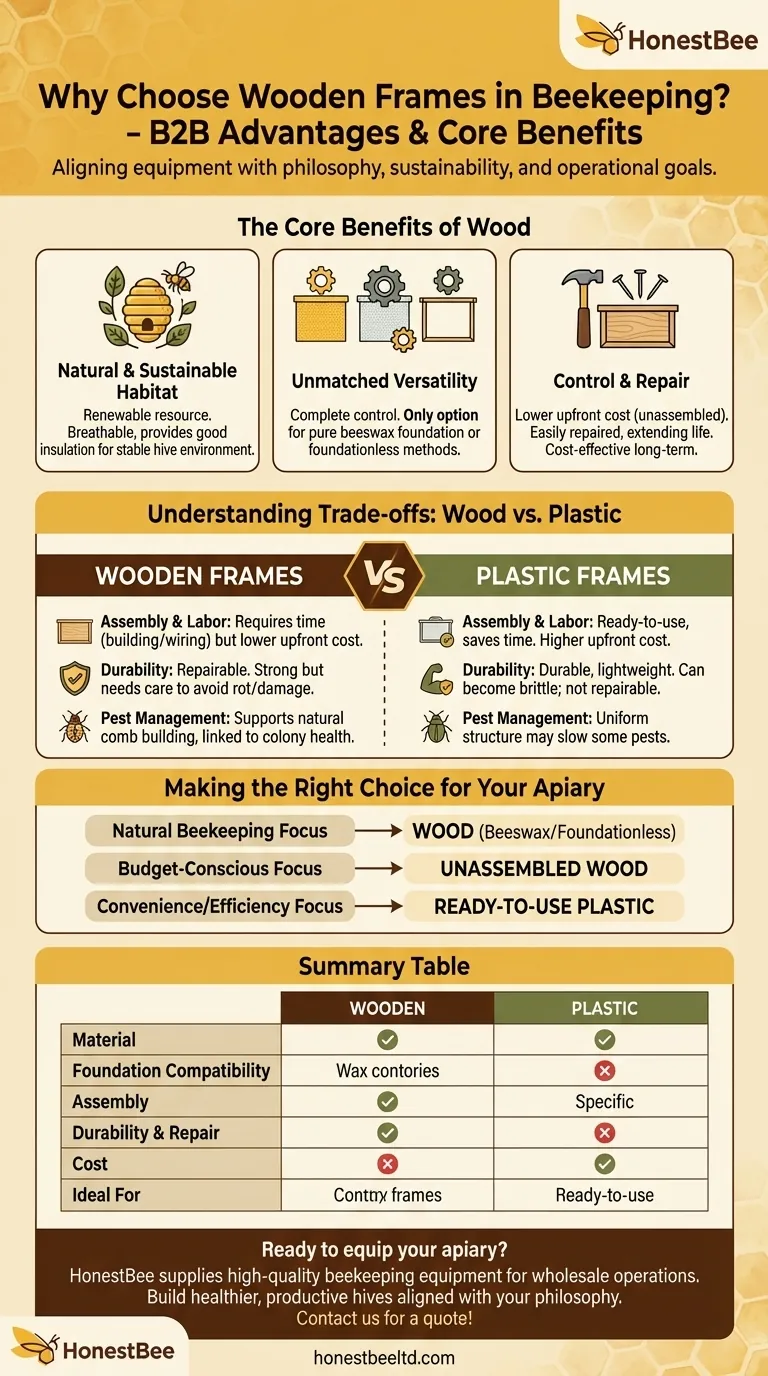
Related Products
- Wooden Bee Hive Frames for Beekeeping and Wholesale
- Professional Galvanized Hive Strap with Secure Locking Buckle for Beekeeping
- Copper Bee Frame Eyelets for Beekeeping
- Versatile Ratchet Hive Strap with S-Hooks for Secure Fastening
- Heavy-Duty Nylon Beehive Hive Strap with Stainless Steel Cinch Buckle
People Also Ask
- How do standardized hives with movable frame designs contribute to apiary efficiency? Scale Your Commercial Operations
- What are the disadvantages of using 10-frame beekeeping equipment? Optimize Your Hive Ergonomics
- What are the key considerations when choosing between 8-frame and 10-frame beehives? Selecting Your Ideal Hive Setup
- What is the specific size difference in width between an 8-frame and a 10-frame hive? 2-Inch Gap Explained
- What is the role of standardized beehive frames in evaluating honeybee production? Optimize Your Apiary Research



